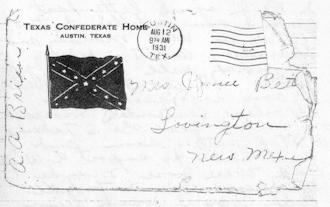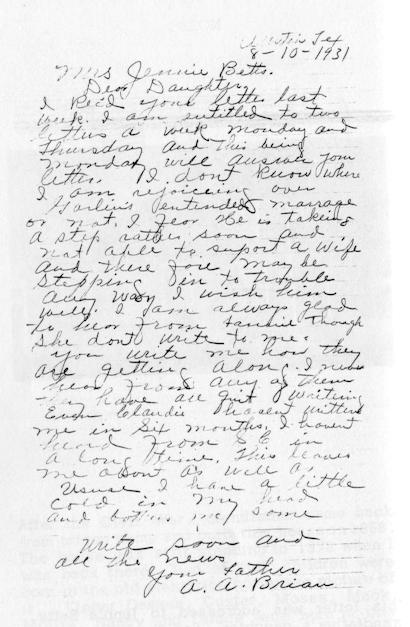
I suppose the first time I can remember seeing my grandfather and grandmother named above was in 1920 when they came to Estacado, Texas, to live with us. Grandmother died in the summer of the same year and grandfather lived with us off and on until he decided to go to the Confederate Home at Austin, Texas, in the year of 1925. In 1928 1 went to Austin for a track meet and visited with him for the last time. He passed away in 1932 and his body was carried back to Gorman, Texas, where he was given a military service and buried by the side of his beloved wife. See head markers on another page.Alfred Aaron Brian was born in Spartanburg County, South Carolina, in 1837. He had three brothers and three sisters. Joe Thomas, Moses, James, Mary, Martha and, Jane. He grew up with plenty and didn't have to work. His father had several Negro slaves and his children were brought up with little to do, other than go to school and have a good time. Aaron finished high school and had some college work. He taught school sometime after the Civil War.
The Old Brian Plantation was on the western side of the North Pacolet River. Across the same river on the eastside was the Ossie McDowell plantation. He had several children, one by the name of Mattie, very beautiful but like her intended husband, Alfred Aaron, reared not knowing how to do anything. I have heard her tell about the hard times she had of doing things for her family after the slaves were freed. Sometime about 1861 or 1862, during the war, they were married.
A. A. joined for duty and was enrolled at Spartanburg, April 13, 1861; was mustered into Confederate service at Orangeburg, June 4, 1861; absent on sick leave August, 1861; in C. A. S. General Hospital, Charlottesville, Virginia, with typhoid fever as reported by Surgeon Thompson. Reported on muster roll of December 31, 1861, as present; promoted to 2nd Sergeant, February 28, 1862; then promoted to Ist Sergeant sometime between February 28 and June 30, 1863. He was a member of Co. E, 5th Regt. South Carolina. Please note his Confederate papers on another page.
[copy of papers were not usable]
I can recall the memoirs of my grandfather as he would tell and relive them. His first war engagement was in the battle of Bull Run. The Confederate forces were entrenched at Bull Run Creek, a tributary of the Potomac. On July 21, 1861, General Joseph E. Johnson, Confederate Commander, was attacked by General McDowell. The Confederate forces fell back in confusion and appeared to be defeated. But they rallied when someone, pointing to General Jackson and his men standing before the Federal advance, cried, "See where Jackson stands like a stone wall. Rally around the Virginians. Let us determine to die here and we will conquer."
Thenceforth, Gen. Thomas J. Jackson, one of the great southern generals, was known as Stonewall Jackson. The Confederate troops pressed forward and the Federal troops, panic-stricken, fled from the field in a complete rout. There had been great enthusiasm in the North over the prospect of this battle and a vast crowd had come out from Washington to" see the Rebels run." These spectators joined the Federal troops and didn't stop until they reached the Capital. I can still hear grandfather chuckle as he would relate this battle.
After the above battle the two armies remained facing each other for nearly a year and they both occupied the time in drilling their troops into effective fighting forces, Hence, why grandfather's furlough in October until December 3, 1861.
Then he would recall the Seven Day Fight around Richmond, June 25 to July 1, 1862. This was one of the most terrible battles of the war. Gen. Lee lost nineteen thousand men and Gen. McClellan lost sixteen thousand Federal troops.
Grandfather would almost be shouting as he recalled the Second Battle of Manassas. Gen. Lee attacked Gen. Pope on the old battleground of Bull Run and drove him and his men from the field. For the second time the victory smiled upon the Confederates at Manassas.
Then he would go to the next battle of Fredericksburg. (I visited this battlefield in 1970. I could feel that I was on hallowed ground.) This battle took place December 13, 1862. The Federals lost 12,653 men, and the Confederates lost 5,309. The night of December 14 was very cold and grandfather was very tired and sleepy. He pillowed his head on a log and went to sleep. When he awoke the next morning Confederate buddies were laughing at him. He got up and discovered that his supposed log was none other than a dead, frozen Federal soldier.
In the spring of 1863, on the second day of May, came the battle of Chancellorsville. It was a brilliant victory, but also a dear one for the South, for it cost them the life of Gen. Stonewall Jackson. Gen. Jackson and some of his men had gone out to view the battlefield and to make plans for the next day. When they came back to their camp it was foggy and they were taken for Union horsemen and fired upon by the Confederates, and Stonewall Jackson was mortally wounded. Grandfather then would say, "The South would have won the war if the life of Jackson hadn't been lost." This battle cost the Federals more than 17,000 men, while the Confederates lost about 12,000 men.
The two armies met again at Gettysburg July 1. The Union lost twenty-three thousand men, while the Confederate dead numbered twenty thousand. This is the battle where grandfather and his brother, Joe Thomas, were wounded and taken prisoners of war, and held as prisoners until after the surrender of Gen. Lee at Appomattox Court House on April 9, 1865.
One night in May of 1865, grandfather arrived in Spartanburg about twelve o'clock at night. He walked all the way from Spartanburg to the old plantation home and arrived about nine o'clock. He had returned to a ruined and neglected home to take up again the occupation of peace in a land bereft and bare.
After no more slave labor, Thomas Brian divided the plantation land among the children. My grandfather received his land from the southwestern corner of the estate, where he built a house for his already started family. See the picture of the house he built on another page. This is the house where my father, Kleber Dessex, was born and some of his brothers and sisters, namely: Custer, Moses, McDowell, Mollie, Fannie and Nancy, while Jennie was born in Little Rock, Arkansas. Joe and Phila were born in old plantation house.
Grandfather sold out and left South Carolina in November 1884. Kleber Dessex and some of the older boys went by land in covered wagons, while the rest went by rail. They settled sixteen miles west of Little Rock in Plasco County. Next year he moved his family again to Saline County, Arkansas, near Hot Springs. In November 1886, he moved his family to Texas. In December of that year they settled in Wolf City, Texas.
This is where I shall leave my grandfather and turn to the life of my own father, Kleber Dessex Brian.

Alfred Aaron and his wife Mattie McDowell Brian and four of their sons from left to right: Tom, Kleber Dessex, Custer and Moses. Their other son, McDowell (Mack) failed to be in picture.

After the Civil War, grandfather came back from prison camp and built this house in 1868. The house was still standing in 1970 when I was back there. Two of their children were born in the old plantation home; see picture of it. Kleber Dessex, Custer, Moses, Mack, Mollie, Nancy and Fannie were born in this house. Jennie was born in Little Rock, Arkansas.

This letter was addressed to Jennie Betts, grandfather's daughter.
